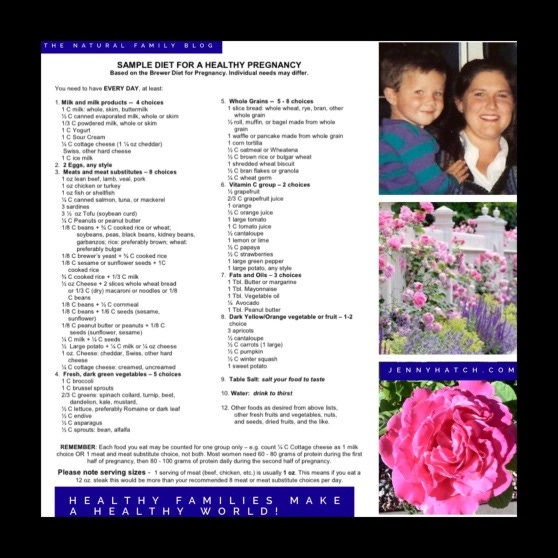The Basic Plan
The following is reprinted and adapted from The Brewer Medical Diet for Normal and High-Risk Pregnancy, by Gail Sforza Brewer (Krebs) with Thomas Brewer, M.D., 1983 (p. 11).
You must have, every day, at least the amounts of food and types of food on the following diet lists (minimum daily food intake). These foods are the best sources of key nutrients essential to healthy pregnancy. It is not healthful for you to go more than twelve hours without good food. Eat a complete breakfast every morning and snack midmorning, midafternoon, before bed, and at least once during the night to maintain a steady supply of nutrition to your developing baby. Consult your doctor, midwife, or nutritionist immediately if you start to fall behind on your diet for any reason. Inability to follow the diet is a medical emergency requiring prompt attention.
It is important to use the Brewer Diet's recommendations for salt, calories, and protein all together. If you try to use lower amounts of salt or calories than is recommended by the Brewer Diet, and focus primarily on the protein, it is likely that the Brewer Diet will not be as effective for you as it could be.
See here for the reasons that salt, calories, and protein are equally important in the Brewer Diet
It is also important to remember that this Basic Plan is just the baseline minimum of the Brewer Diet. There are some women with some situations in which this Basic Plan will be completely inadequate. So please evaluate your own unique situation to see whether you may need to add some additional calories or salt or protein to your personal version of the Brewer Diet.
And please be aware that as your baby and the placenta grow, and as the seasons change, and as other changes occur in your life, you may find that your unique version of the Brewer Diet, which you used effectively last week, may no longer be adequate this week, or next week, or next month. To get the most benefit out of the Brewer Diet, you will need to stay in tune with what your unique needs are every single day.
The information following this checklist will help you to do that personal evaluation.
For those who are wondering, it is best to not use protein drinks during pregnancy. It is better to get your protein from food.
See Q&A section here for info on why not to use protein drinks
You must have, every day, at least: *
1. Milk and milk products--4 choices
1 cup milk: whole, skim,1%, buttermilk
1/2 cup canned evaporated milk: whole or skim
1/3 cup powdered milk:whole or skim
1 cup yogurt
1 cup sour cream
1/4 cup cottage cheese: creamed, uncreamed, pot style
1 large slice cheese (1 1/4 oz): cheddar, Swiss, other hard cheese
1 cup ice milk
1 1/2 cup soy milk
1 piece tofu, 3"x3"x 1/2" (4 oz)
2. Calcium replacements--as needed (2 per soy exchange from group 1)
36 almonds
1/3 cup bok choy, cooked
12 Brazil nuts
1 cup broccoli, cooked
1/3 cup collard greens
1/2 cup kale
2 teaspoons blackstrap molasses
4 oz black olives
1 oz sardines
3. Eggs--2 any style
4. Protein Combinations--6 to 8 choices**
1 oz lean beef, lamb, pork, liver, or kidney
1 oz chicken or turkey
1 oz fish or shell fish***
1/4 cup canned salmon or tuna
3 sardines
3 1/2 oz tofu
1/4 cup peanuts or peanut butter****
1/8 cup beans + 1/4 cup rice or wheat
(measured before cooking)
beans: soy beans, peas, black beans, kidney beans, garbanzos
rice: preferably brown
wheat: preferably bulgar
1/8 cup brewer's yeast + 1/4 cup rice
1/8 cup sesame or sunflower seeds + 1/2 cup cup rice
1/4 cup rice + 1/3 cup milk
1/2 oz cheese + 2 slices whole wheat bread or 1/3 cup macaroni (dry) or noodles or 1/8 cup beans
1/8 cup beans + 1/2 cup cornmeal
1/8 cup beans + 1/6 cup seeds (sesame, sunflower)
1/2 large potato + 1/4 cups milk or 1/4 oz cheese
1 oz cheese: cheddar, Swiss, other hard cheese
1/4 cup cottage cheese: creamed, uncreamed, pot style
5. Fresh, dark green vegetables--2 choices
1 cup broccoli
1 cup brussels sprouts
2/3 cup spinach
2/3 cup greens
collard, turnip, beet, mustard, dandelion, kale
1/2 cup lettuce (preferable romaine)
1/2 cup endive
1/2 cup asparagus
1/2 cup sprouts: bean, alfalfa
Adapted from Right from the Start, by Gail Brewer and Janice Presser Greene, from The Pregnancy After 30 Workbook, edited by Gail Brewer, and from The Brewer Medical Diet for Normal and High-Risk Pregnancy, by Gail Brewer and Tom Brewer, MD.
* Each food you eat may be counted for one group only (in other words, count 1/4 cup cottage cheese as either 1 milk choice or 1 protein combination choice, not both).
**Different Brewer sources recommend different numbers of servings for this food group. Each 1 oz. serving provides 7 grams of protein.
--What Every Pregnant Woman Should Know(1977)--2 servings (3 oz. each)
--The Pregnancy After 30 Workbook(1978)--2 servings
--Right from the Start(1981)--8 servings (1 oz. each)
--The Brewer Medical Diet for Normal and High Risk Pregnancy(1983)--6 servings (1 oz. each)
--The Very Important Pregnancy Program(1988)--6 servings (1 oz. each)
See the last question on my FAQ page.
***Due to mercury content, do not eat shark, swordfish, king mackerel, or tilefish
--You may eat up to 12 oz a week of a variety of fish and shellfish that are lower in mercury:
shrimp, canned light tuna, salmon, pollock, catfish
--Albacore ("white") tuna has more mercury than canned light tuna, so you may eat up to 6 oz of albacore tuna per week.
****Some sources suggest that one possible source of peanut allergies in children may be an excess consumption of peanuts by their mothers during their pregnancy. If you know of any documentation about this, please let me know.
Here's one source of peanut allergy information
Here's another source for info about peanuts and soft cheeses
See Q&A section here for info on why not to use protein drinks
See here for information on the hazards of herbal diuretics in pregnancy




